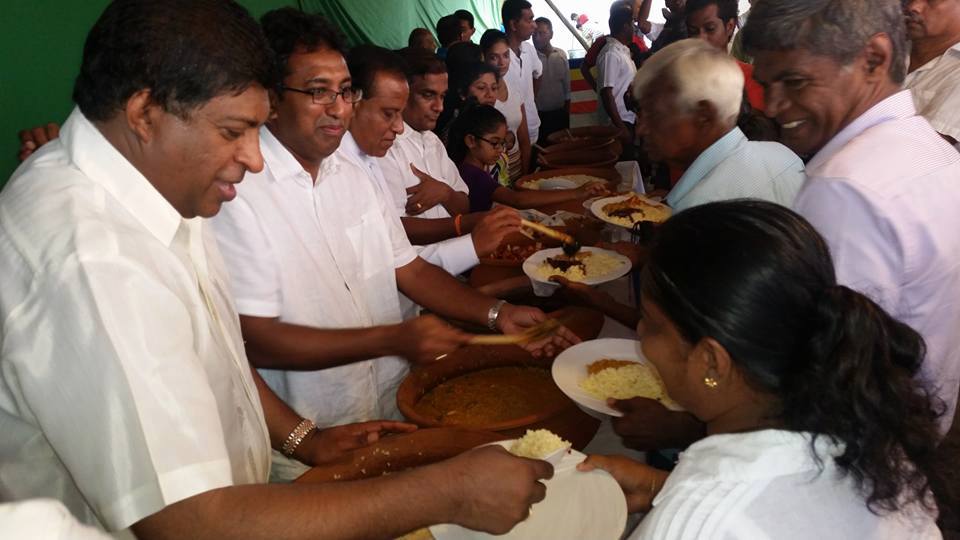Sri Lankan rupee has fallen sharply in value by more than 4 percent
against the US dollar since the Central Bank, in line with government
policy, floated the currency on September 4. By Friday it reached 143
rupees to the dollar as compared to 137 two weeks ago.
The
floating of the currency to depreciate its value is the first major
austerity move taken by the “national unity government” of President
Maithripala Sirisena and Prime Minister Ranil Wickremesinghe.
Finance
Minister Ravi Karunanayake told the Reuters news agency last week that
the government “will ensure that before too long it [the rupee] will be
brought back to an acceptable level.” He did not say what he regards as
an acceptable level.
However, Reuters commented: “The market
expects the currency to fall further in the short term if the Central
Bank fails to tighten interest rates or the country does not see strong
inflows soon.” Since January, the Sri Lankan rupee has depreciated by
about 7.5 percent.
Foreign investors are already leaving to seek
higher profits elsewhere. The Colombo Stock Market has hit a seven-week
low. “Most global investors led by the USA will signal investors to exit
from such fragile markets and re-invest their assets in their home
country, such as the USA, to the detriment of markets, including the
markets in countries like Sri Lanka,” First Capital Equity analyst
Reshan Wediwardena told the media.
An International Monetary Fund
(IMF) team visiting Sri Lanka to discuss the country’s budget praised
the floating of the rupee, which is a longstanding IMF demand. A
statement last Friday declared: “The mission welcomes the CBSL’s
(Central Bank) recent decision to cease setting daily spot prices for
the rupee and let market forces play a greater role in determining the
exchange rate.”
During first half of 2015, the government spent
$US1.4 billion from its reserves to defend the rupee fearing its
depreciation would push up prices and fuel discontent among workers and
poor against the government. The country’s reserves have fallen to $7.5
billion, which includes an Indian loan of $1.5 billion as part of a
currency swap agreement.
Like other emerging economies, Sri Lanka
has been hit hard by international currency turmoil, provoked most
recently by China’s sharp devaluation of the yuan in August and concerns
internationally about the impact of a rise in US interest rates. While
the US Federal Reserve last week postponed an interest rate hike, the
Sri Lankan currency remains under pressure.
The IMF team pointed
to a worsening economic situation in Sri Lanka, predicting growth for
2015 of 5 to 5.5 percent, significantly below the government estimate of
7 percent.
The country’s total debt has ballooned to 8.2 trillion
rupees ($58.7 billion), almost half of which is foreign debt. The
government’s annual debt servicing costs have now surpassed total
government revenue, aggravating the country’s balance of payments
problems.
The trade deficit has increased to $4 billion during
first six months of the year, a 15.6 percent increase compared to last
year. Tea exports are continuing to decline in line with falling
commodity prices internationally.
The falling value of the rupee
will hit the working class and poor the hardest as it will drive up
prices. According to the Sri Lankan-based Sunday Times, the
wholesale traders association complained to Finance Minister
Karunanayake that they were unable to maintaining stable prices.
The
cash-strapped government announced an increase in commodity taxes on
potatoes and sugar of 10 rupees and 12 rupees per kilogram respectively
on September 9. Potato prices instantly rose by 10 rupees but the
government forced sugar merchants not to increase prices. Importers,
however, are insisting that domestic sugar prices cannot be maintained
amid fluctuating international prices and a falling rupee.
On
September 12, in another bid to shore up foreign reserves, the Central
Bank restricted a leasing arrangement on vehicles to 70 percent of their
value, down from 100 percent, in an effort to slow imports.
To
avert a balance of payments crisis, the government is still seeking a $4
billion loan from the IMF, which flatly rejected a similar request in
March citing its failure to cut the 2014 budget deficit to 5.2 percent
of GDP. The government has promised to contain this year’s deficit to
4.4 percent.
The IMF mission is calling for sweeping pro-market
reforms, including in “fuel and electricity pricing, subsidies, trade
policy, liberalisation of factor markets (particularly land), and the
investment environment.” It also advocated “putting state firms on a
commercial footing, allowing them to make market-based financial
decisions (including pricing) and subjecting them to the greater
financial discipline.”
Such “reforms” will impact heavily on the
working class. Fuel and electricity prices have already risen sharply.
The privatisation or corporatisation of key state enterprises such as
Electricity Board, Petroleum Corporation, Water Board and Ports will
only lead to further price hikes and job losses.
Underscoring the IMF’s demands, a column in the Wall Street Journal
on September 15 advised: “Most urgent is macroeconomic stability. Sri
Lanka’s rising debt is unsustainable and the country is heading for
another balance-of-payments crisis. It is dangerously reliant on foreign
commercial borrowings at a time of increasingly volatile capital flows
to emerging markets. Taxation and expenditure need radical surgery to
prevent further public debt accumulation and make debt financing more
sustainable. The printing press must be stopped.”
The columnist
called for a “bonfire of domestic red tape to free up the private
sector,” education reform so as to compete with other cheap labour
countries and the restructuring and downsizing of what it branded as
“bloated, loss-making public sector.”
The new “national unity”
government in Colombo has been formed to ruthlessly implement this
austerity agenda and to suppress any working class resistance. (WSWS)
Home Sri Lanka Think Tank-UK (Main Link)





